Why do christian woman refuse to wear headscarf when praying?
- Thread starter KJ91
- Start date
-
Christian Chat is a moderated online Christian community allowing Christians around the world to fellowship with each other in real time chat via webcam, voice, and text, with the Christian Chat app. You can also start or participate in a Bible-based discussion here in the Christian Chat Forums, where members can also share with each other their own videos, pictures, or favorite Christian music.
If you are a Christian and need encouragement and fellowship, we're here for you! If you are not a Christian but interested in knowing more about Jesus our Lord, you're also welcome! Want to know what the Bible says, and how you can apply it to your life? Join us!
To make new Christian friends now around the world, click here to join Christian Chat.
Really? You couldn't find a good powdered wig. Is this payback for not choosing Flavius?
-
5
- Show all
Powdered wigs are not Biblical! .
-
4
- Show all
-
2
- Show all
And also, why does Paul specifically say while praying or prophesying, as if it's something that can be taken on and off?
wanted to uncover while prophecying... so when Paul says "we have no such custom" he is referring to not having a custom of women uncovering to prophecy... obviously a lot of people disagree with that; but I've seen really good supporting research, it's not just some mysogynists making stuff up.
-
2
- Show all
-
3
- Show all
It depends on who you ask. Some people say that Paul specifies this because the women always covered; but certain women
wanted to uncover while prophecying... so when Paul says "we have no such custom" he is referring to not having a custom of women uncovering to prophecy... obviously a lot of people disagree with that; but I've seen really good supporting research, it's not just some mysogynists making stuff up.
wanted to uncover while prophecying... so when Paul says "we have no such custom" he is referring to not having a custom of women uncovering to prophecy... obviously a lot of people disagree with that; but I've seen really good supporting research, it's not just some mysogynists making stuff up.
Paul was talking about cultural issues of that time, not necessarily that women of every decade, in every generation everywhere had to wear a veil. In the area of Corinth, it was the culture for married women to wear a veil while praying and prophesying to show their submission to their husband as head of their family in the church. But some women were taking their veils off while praying and prophesying as if to show that they're defying their position.
So this isn't about a command from God that women must wear veils when they pray and prophesy for all time everywhere. This was a matter of gender distinction and position. If Paul was here in the now, Paul would have defined how men and women should show distinction between the genders and hierarchy of family (husbands as leaders and wives as under the care, protection and leadership of the husband, and single people as proper single men and women under the care of the Lord Jesus).
❧
-
1
-
1
- Show all
At what age does a female cease being a maiden and becomes a "woman"? Or is it, rather, more accurately to ask, "what circumstance or event transforms the maiden into a woman?
The correct answer to this would greatly aid in my figuring out this mysterious issue.
The correct answer to this would greatly aid in my figuring out this mysterious issue.
How times have changed...
-
1
- Show all
lots of feminists in this forum. modern christian women have been posion by secularism. go back 100 years, all christian women cover their hair when praying back then
-
2
- Show all
A maid or maiden is a virgin. Hence, "old maid" for an unmarried woman.
How times have changed...
How times have changed...
And this understanding makes more sense of all the head shaving going on.
-
1
- Show all
Yes! I was thinking of that particular term when posing the question. I looked up instances relative
to the use of each term and noticed a verse that used both "maidens" and "women," and it was
presented in a context that attached "children" to "women" so, I think that touches on a specific
distinction between the applicability of each term. What seems apparent, to me anyway, that the
"wo(mb)" in a maiden is, ideally at least, inactive or if you will, ying dormant, until she is given to "man."
And this understanding makes more sense of all the head shaving going on.
to the use of each term and noticed a verse that used both "maidens" and "women," and it was
presented in a context that attached "children" to "women" so, I think that touches on a specific
distinction between the applicability of each term. What seems apparent, to me anyway, that the
"wo(mb)" in a maiden is, ideally at least, inactive or if you will, ying dormant, until she is given to "man."
And this understanding makes more sense of all the head shaving going on.
If she was not was a very serious matter. It was policed at the time of betrothal.
Proof had to be given by her family if the man made claims contrary to the maidens'.
Amah, young woman, in Biblical times, was always considered to be a virgin.
If she was not was a very serious matter. It was policed at the time of betrothal.
Proof had to be given by the family if the man made claims contrary to the maidens.
If she was not was a very serious matter. It was policed at the time of betrothal.
Proof had to be given by the family if the man made claims contrary to the maidens.
-
1
- Show all
Imagining a community riddled with shaven women, I see no wonder that long hair would then have been a woman's glory.
uncover their hair. Like an act of rebellion, and/or showing lack of respect.
-
1
- Show all
That's awesome. But I'm going to have to take my hat off more to get my face tanned like the rest of me.
-
2
- Show all




